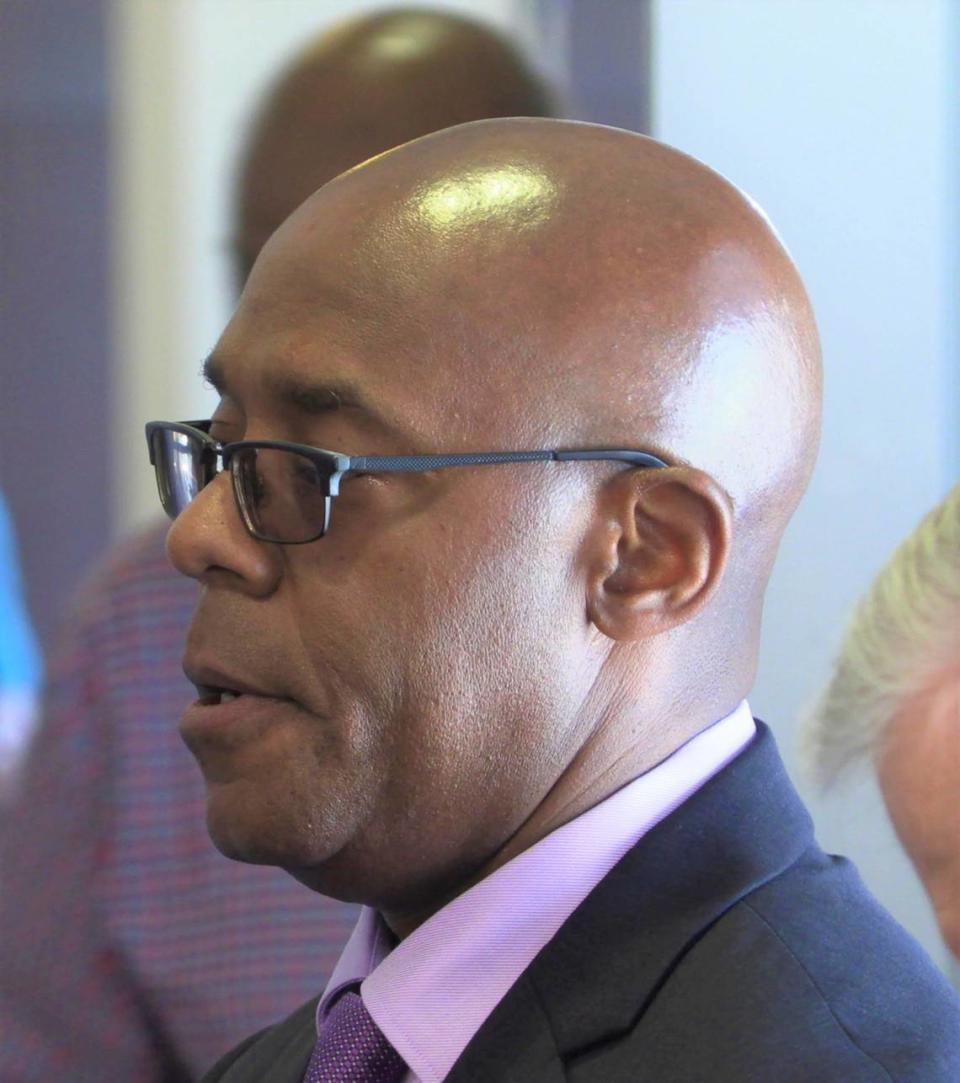Columbus police chief Freddie Blackmon to leave job April 30, takes $400,000 severance
After an hour long closed session, Columbus Council announced Police Chief Freddie Blackmon has accepted a $400,000 severance offer and will leave the city’s employment on April 30.
Mayor Skip Henderson thanked the chief for his service and councilors stood to applaud him. Blackmon immediately left without comment.
Some details of the severance package include:
Blackmon is to take paid time off starting today and retire April 30.
The assistant chiefs will run the department as the city goes through the Georgia Association of Chiefs of Police to seek an interim chief.
The mayor will appoint the interim, and that will not require council confirmation.
Blackmon will continue to get his city health insurance at the employee rate until he reaches retirement age.
The chief has also agreed not to pursue legal action against the city, the mayor said.
Columbus Council had called a special meeting at 3 p.m. “for the purpose of going into executive session to discuss matters of personnel and potential litigation.”
Blackmon faced a Wednesday deadline to reject or accept a $250,000 severance deal that Mayor Skip Henderson sent him on March 15. The chief hired an Atlanta law firm that sent the mayor a March 28 counter proposal seeking around $850,000, and threatening to sue on claims of racial discrimination.
Blackmon is represented by Buckley Bala Wilson Mew, which specializes in employment law. It claimed the city is ending the Black police chief’s employment based on his race, in violation of his civil rights.
The called council meeting did not draw the same crowd of Blackmon supporters that swarmed previous meetings on April 28, March 14 and March 28, when they held a rally outside the building.
About a dozen people were in the audience when council voted unanimously to go into closed session at 3:04 p.m.
Among Blackmon’s advocates there were Local NAACP President Wane Hailes, Muscogee school board representative Pat Hugley Green, the Rev. Adrian Chester, and Marvin Broadwater, who organized the March 28 rally to support the chief.
A local resident weighed in on the entire event.
“When your elected officials do not represent the majority of the voters in this city, we have a problem,” said Marvin Broadwater Sr. after the council’s decision. “Its a travesty. You pushed this man out.”
Broadwater found issue with the city council requesting Blackmon’s strategic plan and offering him a severance package the next day.
“The process was flawed, the transparency in this process was flawed,” Broadwater said. “We’ve got to do better Columbus, we’ve got to elect people that represent us.”
He said some people will be glad with the city council’s decision but those people are a minority in their beliefs.
”It’s the trust that many of us no longer have. It’s a sad day in Columbus,” he said.
Blackmon also came in shortly before the meeting began. He declined to comment.

Henderson offered Blackmon the city’s severance package the day after the chief presented a strategic plan to address issues raised in a police department study authored by the national consulting firm Jensen Hughes.
Blackmon’s attorneys claimed the Jenson Hughes study was biased, having relied heavily upon complaints from Columbus’ Fraternal Order of Police. The police officer heading that group, Lt. Ralph Dowe, who is white, has sued the city on claims that he was denied promotion because of his race.
Blackmon now is being targeted because of his race, and faces consequences from that discrimination, his attorneys wrote:
“While Chief Blackmon has suffered a complete disruption of his life as a result of the city’s unlawful conduct, along with potentially significant financial loss, and he is prepared to pursue his claims, we believe a prompt settlement of this matter is in the best interest of both parties.”
They added that under Title VII of the Civil Rights Act of 1964, Blackmon was “entitled to recover his lost wages, compensatory damages, and an award of attorneys’ fees and costs of litigation in the event he prevails on the merits of his claims against the city. In cases involving a public employer, a court may award front pay for the entire remainder of a plaintiff’s career.”

Severance proposals
These were Blackmon’s demands in the firm’s letter addressed to Mayor Henderson:
$646,053, or five years of his base salary through age 62
$200,000 compensatory damages under Title VII and the equal protection clause of the 14th Amendment
Health insurance through May 31, 2030
All vacation and overtime accrued as of the date he leaves the city’s employment
Eligibility in the city pension plan
Full vestment in the city’s Deferred Retirement Option Plan, commonly called “DROP,” as if he retired on Oct. 31, 2027, at age 62
$15,000 in attorneys’ fees
Here are highlights of the severance package the city offered Blackmon:
A one-time lump sum gross payment of $250,000
Health insurance benefits until May 2030
Compensation for unused vacation time
Eligibility for participation in the city pension plan to leave his position by April 5
Blackmon, a Columbus native who started at the police department in 1986, is the city’s second Black police chief. His appointment to that position unanimously was confirmed by Columbus Council on Nov. 17, 2020. His annual salary currently is $161,513,
The Jensen Hughes report found the police department not only was losing experienced personnel, but failing to retain new officers, once they were fully trained. Officers complained of low morale, poor communications from leadership, and micromanagement.
Blackmon’s strategic plan called for boosting the number of sworn officers from 488 to 572, increasing financial benefits and restructuring the department. The current starting pay for a rookie police officer with a high school education is $50,121 a year.

